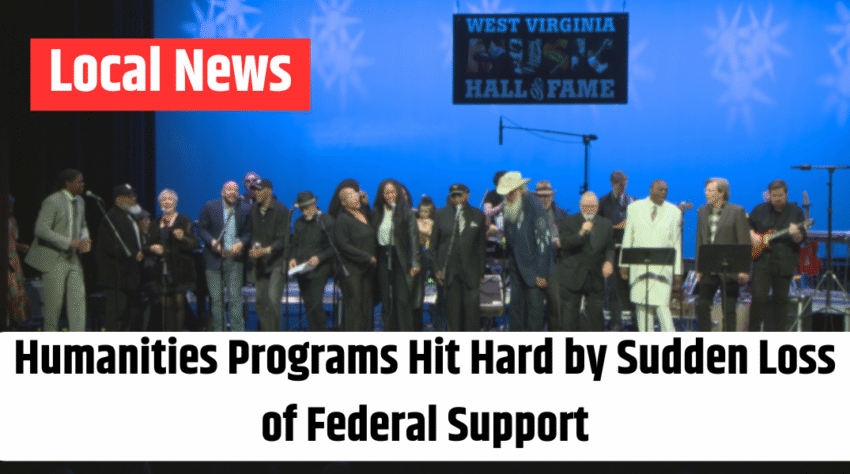The West Virginia Music Hall of Fame ceremony carried on in Charleston Saturday night, despite an unexpected funding cut that threatened to derail the entire event just days before it was set to take place.
Four influential musicians—Daniel Johnston, Cameron LaVelle Mullins, Jeff Stevens, and The Valentinos—were officially inducted during the musical gala, joining a prestigious list of honorees dating back to the nonprofit’s founding in 2005.
The event, however, was nearly upended by the sudden withdrawal of federal grant money from the West Virginia Humanities Council, a longtime partner and partial funder of the Hall of Fame. According to Hall of Fame founder and director Michael Lipton, the group typically receives about $13,000 from the Council—roughly one-third of the ceremony’s total budget.
“We raise funds and sell tickets, so we’re not entirely dependent on grants,” Lipton said. “But that support is absolutely factored into our planning.”
Just days before the ceremony, Lipton learned that the remainder of the Humanities Council grant would not be disbursed—not just to the Hall of Fame, but to all recipients statewide. The news came as travel plans were already locked in and contracts with performers were finalized.
Also Read – Faith Leader Warns DEI Ban Will Lead to Greater Exclusion
Faced with few options and limited time, Lipton said canceling the event wasn’t possible. “You’re days away, and everything is in motion. We had to move forward,” he explained.
The broader issue stems from sweeping federal funding cuts to the National Endowment for the Humanities (NEH), which supports humanities councils in every U.S. state and territory. Eric Waggoner, Executive Director of the West Virginia Humanities Council, said he was notified in the middle of the night via an NEH letter that their federal funding had been terminated immediately—despite previously being approved by Congress.
“I woke up during a storm and checked my inbox, and suddenly I’m seeing messages from my counterparts in other states—‘We got cut off.’ ‘It’s gone.’ We all got the same notice,” Waggoner said.
He called the cuts “unprecedented,” especially since the money had already been appropriated through the standard budgeting process. “This level of unpredictability jeopardizes everything we’ve worked to build over 50 years,” Waggoner said.
The Council’s federal grant typically totals around $965,000 annually, and it serves as the backbone of grant funding for cultural institutions and programs across all 55 counties. Because much of the Council’s other funding relies on matching federal dollars, the loss ripples out even further.
“Private donors and local sponsors can’t fill a million-dollar gap in West Virginia,” Waggoner noted.
Among the many institutions impacted are community museums, libraries, arts festivals, educational exhibits, and classroom enrichment programs. The Hall of Fame is one of many trying to figure out how to make up for the sudden shortfall. Lipton said he’s hesitant to ask his supporters for more when they’ve already given generously.
“There’s no easy way to make up that kind of loss,” he said. “But these programs mean something. People pour their hearts into this work. You can’t put a price on that kind of passion.”
Lipton added that while some might view music and arts programming as nonessential, these cultural experiences are deeply woven into the state’s fabric—offering both joy and solace through life’s ups and downs.
“It’s not just about entertainment,” he said. “It’s about community. It’s about identity. It’s about healing. These programs matter.”
Despite the challenges, Saturday’s Hall of Fame ceremony went on with celebration and spirit—serving as a testament to the resilience of the state’s creative community, even in uncertain times.
